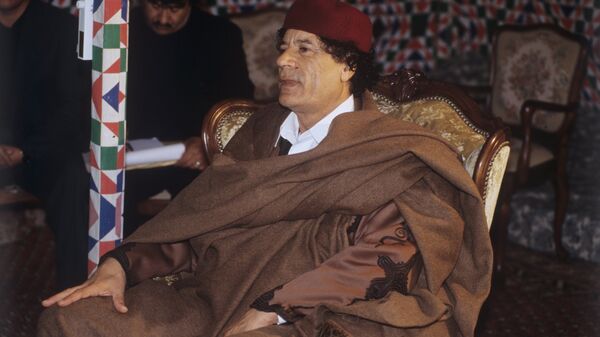Several former rebel fighters now back in the UK have revealed they were able to travel to Libya "no questions asked," and believe their voyages were actively facilitated by authorities. Many had been subject to controversial "control orders" — effectively house arrest — introduced under counterterrorism legislation passed following the 2005 London bombings.
The orders allowed authorities to restrict the movements of individuals suspected of involvement in terrorism and extremist activities, requiring them to remain at a registered address for up to 16 hours a day, electronically tagging them, limiting access to communications resources and banning them from meeting or communicating with other people deemed to be of concern.
*** So, Abedi likely to have been part of Libyan Islamic Fighting Group. Backed covertly by UK to assassinate Gadafi https://t.co/MneebE4Yga pic.twitter.com/o8mvKWChJ4
— Mark Curtis (@markcurtis30) May 24, 2017
At least 12 individuals subject to control orders were suspected of having direct and indirect connections with the al-Qaeda connected Libyan Islamic Fighting Group, an anti-Gaddafi Islamist militant group founded in 1990.
However, in 2011, as US, British and French airstrikes rained down fiery destruction on Tripoli, their orders were lifted and passports returned.
One individual en-route to the war-torn country was stopped under "Schedule 7" — counterterrorism powers that allow police and immigration officials to detain and question any person passing through border controls to determine whether they are involved in terrorism.
He was asked by an MI5 officer whether he was "willing to go into battle," and told British government had no issue with anyone who wished to fight against Gaddafi.
BREAKING: Father of #Manchester suicide bomber UK-#Libya dual nat'l Salman Abedi joined the Libyan Islamic Fighting Group (LIFG) in 1994 pic.twitter.com/pnZhL9KA0Z
— James Wheeler (@wheelertweets) May 24, 2017
The same individual was stopped again on a subsequent journey to Libya in May 2011, and told if he was going to fight in the country he would be committing a crime — however, after providing them with the name and phone number of the MI5 officer he had previously spoken to, he was allowed to travel.
While the vast majority of UK citizens who went to fight in Libya hailed from Manchester, and Manchester attacker Salman Abedi's father Ramadan was among them, it's unlikely Salman himself fought — he was but 16 at the time, and fighters were typically aged 18 and over.
Nonetheless, he is known to have visited the country several times during and after the revolution, and to have associated with Anil Khalil Raoufi, a Daesh recruiter from Didsbury killed in Syria in 2014.
One British-Libyan fighter even described doing "public relations work" for the rebels prior to Gaddafi's violent overthrow, editing "slick, professional" videos depicting Libyan rebels being trained by former British SAS forces in Benghazi, in order to drum up financial support for the insurrectionists.
Moreover, he trained young Libyans to use cameras so they could sell packages to international media.
#ManchesterBomber Salman #Abedi had ties to the Libyan Islamic Fighting Groups. The #US supported this terror group against Khaddafi in 2011
— Brasco_Aad (@Brasco_Aad) May 24, 2017
LIFG-connected Libyan exiles in the UK were placed on control orders and subjected to surveillance and monitoring following the reconciliation between the British and Libyan governments guided by then-Prime Minister Tony Blair and Gaddafi in 2004.
Documents retrieved from the abandoned Libyan intelligence agency offices following Gaddafi's murder demonstrate that as part of the deal, MI5 and MI6 cracked down on Libyan dissidents in the UK. The services also assisted in the "extraordinary rendition" of Abdel Hakim Belhaj and Sami al-Saadi to Tripoli — the pair claim they were tortured, and are suing former MI6 counterterrorism chief Sir Mark Allen for his role in their capture.
One LIFG member, Ziad Hashem, was imprisoned for 18 months without charge and, restricted to his home for a further three years based on information potentially supplied to UK authorities by Libyan intelligence. However, he says when the "revolution" started in Libya "things changed" in the UK — authorities lifted all restrictions and offered him indefinite leave to remain or citizenship.
We know the suicide bomber was 23 yo Salman Abedi who was "known to the security services." Of course he was, they almost always are. /2
— John Schindler (@20committee) May 23, 2017
The revelations come as UK authorities delve ever-deeper into the background of Abedi, who killed 22 people in Monday's (May 22) attack in Manchester. He is believed to have been part of a network, and six have been arrested since the strike — including Abedi's older brother.
He was also known to security services, and several people had previously reported him to the police via an anti-terrorism hotline.
On May 24, Libyan authorities arrested Abedi's younger brother and father, Hashem and Ramadan, on suspicion of having connections to Daesh.




